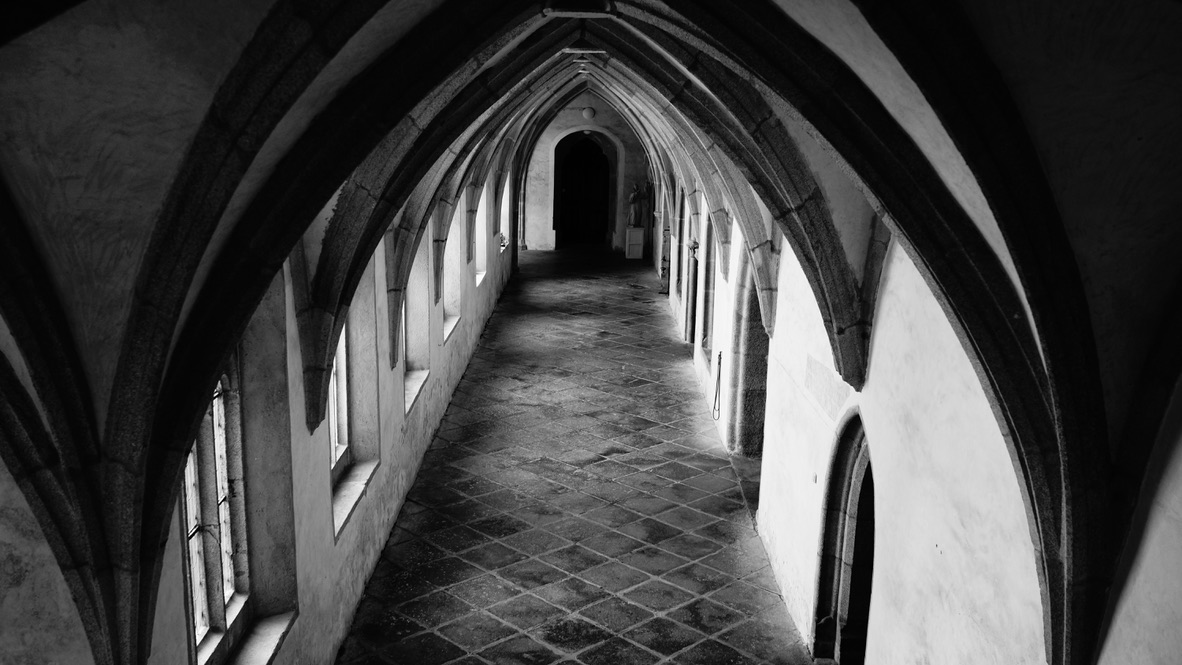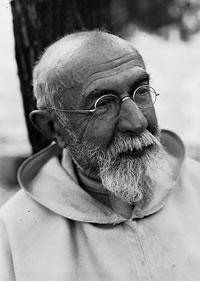With few and reasonable words (VII:11)

8 Feb. 9 June. 9 Oct.
The eleventh degree of humility is, that when a monk speaketh, he do so gently and without laughter, humbly, gravely, with few and reasonable words, and that he be not noisy in his speech, as it is written: “A wise man is known by the fewness of his words.”
The Ninth, Tenth, and Eleventh Degrees of Humility occur at the same time as the feast of the Most Pure Heart of Mary in our proper liturgical calendar. Silence and humility become the virtues of predilection of souls who approach the Most Pure Heart of Mary, and who linger in her company. Our feast of the Most Pure Heart of Mary was instituted by Saint Jean Eudes on February 8, 1648, and later adopted by Mother Mectilde de Bar and the Benedictines of the Most Holy Sacrament. The feast falls most appropriately within the Octave of the Purification of the Blessed Virgin Mary; it is a liturgical rumination of the prophecy of Saint Simeon and, at the same time, of the two Lucan verses concerning the Immaculate Heart of Mary:
And Simeon blessed them, and said to Mary his mother: Behold this child is set for the fall, and for the resurrection of many in Israel, and for a sign which shall be contradicted; And thy own soul a sword shall pierce, that, out of many hearts, thoughts may be revealed. (Luke 2:34–35)
But Mary kept all these words, pondering them in her heart. (Luke 2:19)
And his mother kept all these words in her heart. (Luke 2:51)
 Saint Benedict tells us that certain things are incompatible with humility: much talking; boisterous or sarcastic laughter; talking that is disproportionately loud; and talking that is inflated by the need to affirm oneself and impose one’s thoughts on others. All these things are indicators of pride. A sure cure for these things is a man’s intimacy with the Most Pure Heart of Mary.
One cannot live in the presence of Mary without growing in the practice of humility and silence. In this regard, the rosary is a school of humility and silence. Not only does the rosary, as Father Marie–Joseph Lagrange, O.P. (1855–1938) once said, “decapitate pride”; it also opens the door of an interior cloister that is perfectly silent, giving access to the hortus conclusus that is the Immaculate Heart of Mary.
Saint Benedict tells us that certain things are incompatible with humility: much talking; boisterous or sarcastic laughter; talking that is disproportionately loud; and talking that is inflated by the need to affirm oneself and impose one’s thoughts on others. All these things are indicators of pride. A sure cure for these things is a man’s intimacy with the Most Pure Heart of Mary.
One cannot live in the presence of Mary without growing in the practice of humility and silence. In this regard, the rosary is a school of humility and silence. Not only does the rosary, as Father Marie–Joseph Lagrange, O.P. (1855–1938) once said, “decapitate pride”; it also opens the door of an interior cloister that is perfectly silent, giving access to the hortus conclusus that is the Immaculate Heart of Mary.
 Mother Mectilde writes:
Mother Mectilde writes:
Yes, I say that silence is a very holy thing. Silence dispels the clouds and puts to flight the shadows within; it calms a soul and puts one in possession of a great peace, by means of which one enters into union with Jesus Christ, who reveals himself in the depths of such a soul and communicates himself in a way that is ineffable. Silence disposes a soul to interior prayer. Someone may perhaps say to me, “I keep silence as best I can. I only speak in turn and, when necessary, I stay withdrawn in my cell, and still I have not become a person of interior prayer.” That may well be. But you must know that silence has several degrees. There are some who, in truth, keep a silence of speech, but who inwardly babble and make a din. This keeps them from hearing the Eternal Word that cannot reveal Itself in such souls any more than it would be possible for you to see yourself in a mirror that was constantly being moved about.
There is, then, exterior silence, which is a very good thing provided that it be accompanied by the interior silence that puts a stop to the mental babble, and removes us from all creatures and from ourselves. There is a third silence, more intimate and more perfect, which makes the soul enter into union with God. This is the silence of the faculties, and so forth. This is beyond us; we are not there, and even if I were to want to speak of it, I myself would not know what I would say.
Let us enter then in to the practice of the first two silences, and we shall go very far. Let us keep ourselves from being preoccupied with things that are not our business. Let us hold our spirit in recollection and, when it wanders, bring it back almost imperceptibly. There are some who become upset with themselves and who put themselves down, seeing their own lack of depth, and who say, “Oh! I am so miserable, etc.” No . . . believe me, you mustn’t carry on like that, but rather gently accustom yourselves to recollection and to the actual presence of God. And if you see yourselves all distracted and scattered, change the object of your attention. Leave the creature and look to God, as if you were turning over a medal, and say, “My God” or “My All” and so allow yourselves to be carried along towards this divine object without violence. You will come to see that with a little bit of fidelity you will put a stop to the flightiness of your spirit and become accustomed to silence and recollection and, in this way, little by little make great progress in prayer. (Conference 31 December 1662)
Share this:
- Click to share on Twitter (Opens in new window)
- Click to share on Reddit (Opens in new window)
- Click to share on Facebook (Opens in new window)
- Click to share on Pinterest (Opens in new window)
- Click to share on X (Opens in new window)
- Click to share on WhatsApp (Opens in new window)
- Click to print (Opens in new window)
